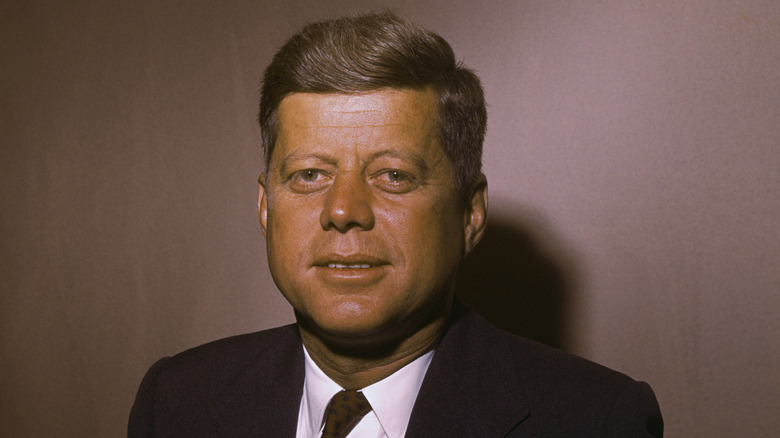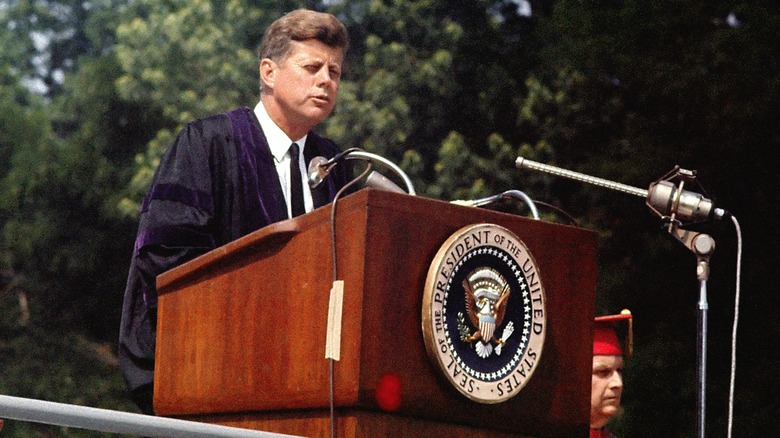John F. Kennedy's Autopsy Report Has Some Chilling Details
November 22, 1963, is etched in history as a day when time seemed to stand still. On that day, President John F. Kennedy was fatally shot while rolling through Texas in a motorcade with his wife, Jackie Kennedy, and Texas Governor John Connally. Officially, the finger pointed at Lee Harvey Oswald, a man with motives still murky to this day. But that didn't stop a slew of conspiracy theories from taking off. Maybe it was the Cubans or the Russians, or perhaps Vice President Lyndon B. Johnson, who conveniently stepped into the presidency after Kennedy's death. Some even suspect the CIA had been involved. Fast forward to today, and these theories still persist. What remains indisputable, however, is that JFK's death was the result of gunfire, though his official autopsy unearthed more than just the obvious.
Just mere hours after he was declared dead, an autopsy at the National Naval Medical Center in Bethesda, Maryland, confirmed that JFK was hit by two separate bullets from behind. "It is our opinion that the deceased died as a result of two perforating gunshot wounds inflicted by high‐velocity projectiles fired by a person or persons unknown. The projectiles were fired from a point behind and somewhat above the level of the deceased," the report read, per The New York Times, noting that one bullet went through his neck and the other severely damaged his brain. "It is our opinion that the wound of the skull produced such extensive damage to the brain as to preclude the possibility of the deceased surviving this injury."
But that's not all. The autopsy also revealed that JFK had an autoimmune disease he had quietly been dealing with, a fact the public never knew — and something he, too, reportedly denied.
Medical professionals discovered that JFK had Addison's disease
President John F. Kennedy once bragged he was "the healthiest candidate for president in the country" — a claim that, in hindsight, was more than a little optimistic. JFK kept up a polished image of vitality and strength, but he was fighting off a laundry list of health issues that made him practically a walking pharmacy, juggling various medications just to get through the day. His autopsy, as The Washington Post revealed, confirmed what many had suspected all along — that he'd been dealing with Addison's disease, a rare adrenal disorder that had practically left him without functioning adrenal glands.
For years, JFK and the Kennedy family denied rumors of such illness, insisting he was as healthy as a horse. But the truth was he had been diagnosed with Addison's back in 1947 — over a decade before his sandal-ridden White House days. By 1955, hypothyroidism joined his list of ailments, adding more pills to the regimen. Dr. Lee R. Mandel, a Navy Medical Corps endocrinologist who pored over JFK's records, told The Los Angeles Times that the late president wasn't just popping the occasional aspirin — he was on hydrocortisone, prednisone, liothyronine, and fludrocortisone. He also took a cocktail of painkillers, antibiotics, antihistamines, antispasmodics, and even antipsychotics.
"He was never healthy. I mean, the image you get of vigor and progressive health wasn't true. He was playing through pain most of the presidency," Washington-based physician Dr. Jeffrey Kelman, who also examined JFK's health records, told PBS. "He was living with a disability which probably would get him federal disability or retirement if he was around today. .. He was on enough pain medications to disable him. And he survived through it. He came out of it, and he performed at the highest level."


